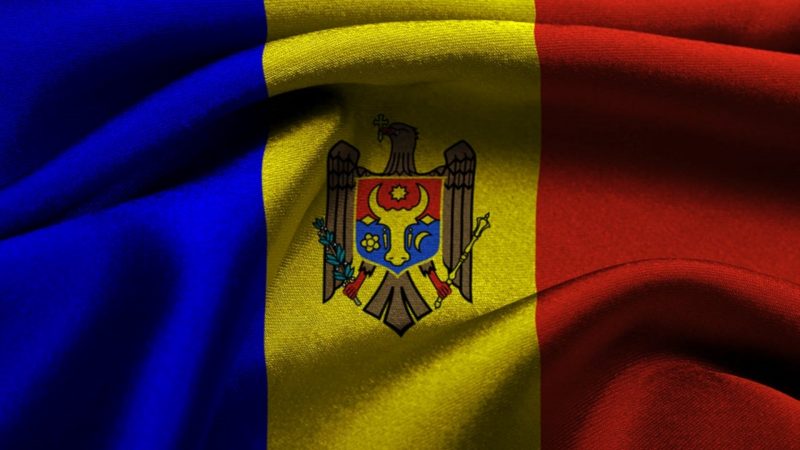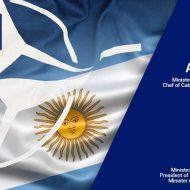The second round of the presidential elections in Moldova and the victory of the pro-Western candidate Maia Sandu has brought the attention of the world to this Eastern European country. In this article, I will try to evaluate the elections in Moldova within the context of the historical background of the country.
A conflict zone between Russia and the West
Despite being a relatively small country (33.846 km2) with a small population (3.5 million people) in Eastern Europe, Moldova has nonetheless been one of the main conflict zones between the West and Russia. Moldova, Ukraine and Belarus are the three former Soviet countries in Eastern Europe, which have been the arenas of a power struggle between the USA and the EU on the one hand and Russia on the other. Unlike their western neighbors, these three countries are not members of NATO or the EU and the political processes and the political conflicts in those countries are mostly (although not completely) a part of the struggle between the West and Russia. Moldova is included in the Eastern Partnership of the European Union and in this way, the EU (and the US) have been trying to integrate Moldova into Europe. When it comes to the formation of coalition governments, both European and Russian officials pay frequent visits to Moldova, delineating it as a line of conflict
Moldova is, together with Ukraine, one of the two poorest countries of Europe. For this reason, many Moldovans migrate to Europe, Russia, or Turkey for work. The country has also been associated with corruption, an issue related with Moldovan politics in general.
Permanent political Crises
Moldova is an arena for permanent political conflicts and ethnic seperatist conflicts. The population and the political scene have been polarized mainly between pro-western and Pro-Russian political forces and the 29 year long independence period of Moldova has witnessed many political conflicts between those two groups. Moldova’s political scene has seen heavy circulation. For this reason, almost all of the political figures of Moldova who were prominent six years ago have disappeared from the political scene completely. But despite the fact that political actors in Moldova change within short periods, those two political camps (pro-Russian and pro-Western camps) and their electoral base, remain. In addition, each of those camps are also fractionized among themselves. Since the supporters of those two opposite political camps are about equal to each other, Moldova is one of the most unstable countries in Europe. It will be enough to say that because of this crisis and polarization, Moldova had not been able to elect a president for 2,5 years (from 2009 to 2012) and the country had been managed by the chairmen of parliament, who had deputized for presidency.
Separatism in Moldova
This relatively small country has also been an arena for seperatist conflicts. On of the five breakaway regions (regions, which have declared independence but not recognized by the international community) in the former Soviet geography exists in Moldova: the Transnistria region, located on the east bank of the river Dniester, inhabited by Slavic ethnic groups (Russians and Ukrainians) and the Moldovans that feel themselves closer to Russian mentality, broke away at the time of the collapse of the Soviet Union, following a brief but bloody war, in which approximately 3000 people died. At that time, the 14th Soviet Army – not yet dissolved – had rendered active support to the forces who wanted to secede. Since the beginning of the 1990s’, Moldovan authorities have had no control on that region and there are still Russian forces there. In Transnistria a self proclaimed government exists, the fifth breakaway region of the former Soviet territories (the others are, Abkhazia and South Ossetia in Georgia, Karabagh of Azerbaijan and the Donbas region of Ukraine).
Union with Romania
Another dimension of the ethnic and geopolitical tension is related to Moldovan national identity. Moldovans are of the same origin as the Romanians. While it was a part of the Moldovian Principality (a Romanian principality, which became a vassal state of the Ottoman Empire), the territory between the Prut and Dniester rivers (most of the territories of today’s Moldova) were annexed by Tsarist Russia and formed the Bessarabia region of Russia. Thus, the inhabitants of the eastern bank of the River Prut were separated from their kinsmen on the other side of the river. Consequently, the people of the two sides of the river started to differ in their mentality.
The inhabitants of today’s Moldova did not become a part of the nation building process in Romania, which was introduced in Romania beginning from the 1860’s, following the union of the Wallachia and Moldovias principalities and foundation of the Romanian Principality. The territory between Prut and Dniester was captured and annexed by Romania in 1918, under the conditions of turmoil and civil war in ex-Tsarist territories following the Russian Revolution of 1917. Thus, today’s Moldovans came under Romanian rule and during the 1930s’, they were ruled by the fascist regime in Romania. This period caused negative reactions in most Moldovans towards Romania. Meanwhile, Soviet authorities had established an autonomous region on the eastern bank of the River Dniester (which is today’s Transnistria) in the then Ukrainian Soviet Socialist Republic under the name “Moldovan Autonomous Soviet Socialist Republic”. Here, they helped development of Moldovan national identity. In 1940, upon the ultimatum of the Soviet leader Stalin, Romania was forced to give the Bessarabia region back to the Soviet Union. The Soviets brought together Besarabia and the autonomous Moldova region of Ukraine together and established “Moldova Soviet Socialist Republic”. However, in 1941, this region was occupied by Nazi German and Romanian forces and Moldova enjoyed Romanian rule three more years, until its liberation by the Soviet forces in 1944. From there on, until the collapse of the Soviet Union in 1991, Moldova was one of the 15 founder republics of the Soviet Union.
However, at the end of the 1980s’, i.e. during the disintegration period of the Soviet Union, a number of the supporters of unification with Romania (the “Unionists”) grew immediately. However, those unionist tendencies created great concern among the non Moldovan population and this was one of the main reasons that triggered the seperatist movements in Transnistria. In addition to the Slavic population, Gagauz Turks in the south had also opposed unionism, remembering the fascist period of the 1930s’ and the Romanian occupation period between 1941-44. Although the unionist tendencies were quite strong at the beginning of the 1990s’, it soon started to decline since at that time Romania itself was in volatile conditions and could have offered nothing to Moldova. Today, the situation is different: For the last ten years, Romania has been the biggest trade partner of Moldova (Russia fell to the third place) and many Moldovans migrate to Romania for work. Many Moldovan students get education in Romanian universities. After Romania became a member of the EU in 2007, it became a center of attraction for Moldovans and many Moldovans, including many high level politicians have acquired Romanian passports. However, despite those facts, the Unionist movement is not yet a prevailing movement even among the pro-Western electorate. In other words, not all of the supporters of European integration in Moldova support unionism with Romania. Many of the opponents of unification (also among the pro-Western electorate) remember the 1930s’ and the occupation period and say that unification may bring colonisation of Moldova by Romania. Nevertheless, pro European governments in Moldova have changed the history text books for students (the winner of the last elections Maia Sandu was also once minister of education and she had also participated in this process) and brought the history books in conformity with the ones in Romania. Moreover, pro-Western politicians mention the entry of the Soviet troops to Moldova in 1940 (ie, the end of the Romanian rule) as a Soviet occupation; not liberation of Moldova. In this sense, it can be said that, although not all of the pro-Western politicians are supporters of immediate unification, it can be said that they pay the way for a future annexation and creation of a “Greater Romania”. Roamnian nationalists, on their part, wish for the annexation of Moldova. Thus, the politics of Moldova are also closely related with Romania’s probable expansion and the change of power in the Black Sea region.
Gagauz Turks
The Gagauz Turks have their autonomous regions in the south. Almost all of the Gagauz Turks are of the Orthodox faith. Most of them have sympathy towards Russia and they oppose unionist movements in Moldova. As a matter of fact, in almost all of the elections, pro-Russian candidates get the highest vote percentage from this region. Thus, in the last elections, almost 95% of those who voted in this region voted for the current president of Moldova (the pro-Russian candidate) Igor Dodon.
We might depict the political map of the country in this way: The breakaway Transnistria region’s inhabitants (those who have Mldovan citizenship) are allowed to vote for elections in Moldova and, as one might predict, the vast majority of them vote for pro-Russian candidates in Moldova proper. When it comes to the government controlled areas, we see that the northern regions of Moldova (including Balti, the second biggest city of Moldova) and the southern regions (including the Gagauz Yeri Autonomous Republic) mainly vote for pro-Russian candidates, while the central regions (including Chisinau, the capital of Moldova) mainly vote for pro-Western candidates. Accordingly, the unionist movement is also relatively stronger at the center (although, even in the capital, less than half of the people support union with Romania).
As mentioned above, Moldova, as a result of its poverty, has a great diaspora in Russia and in Europe. In the elections, the Moldovan diaspora in Russia mostly votes for the pro-Russian candidate, while the diaspora in European countries mostly vote for the pro-Western candidate. As it will be emphasized below, especially in the last elections, the diaspora played a key role.
The Reasons of the victory of the pro-Western Candidate
Moldova has been electing its president by popular vote since 2016 (previously, the president used to be elected by the parliament and since the pro-Russian and pro-western parties had had almost equal mandates, it was extremely hard to elect a president. Thus, that system used to further intensify the political crisis in Moldova). In the elections in 2016 and 2020, the main candidates were the same: the pro-Russian candidate, the leader of the Socialist Party of Moldova (and the current president of Moldova) Igor Dodon and the pro-Western candidate the leader of the Action and Solidarity Party Maia Sandu. In the previous elections, Dodon had got more votes in the first round and won the second round. But this time, the results were the opposite: In the first tour, Dodon got 32,74% of the votes, while his rival Sandu got 35,93%. In the second round, the gap between them was even bigger: Sandu got 57,72% of the votes, while Dodon got only 42,28 of the votes: The gap was more than 15%. Such results (of both the first and the second round) were a surprise for many observers. The reasons of those surprise results may be explained in this way:
– The voter turnout in the first round was recordly low: 42,73%. In the second round as a result of mobilization of the voters of both camps (mainly the supporters of Sandu), the turnout became 52;59%. Hence, it should be noted that Sandu won only 57% of this 52,59%. Many pro-Russian voters simply did not vote. These figures do not actually indicate mass popular support for Sandu.
– One of the main problems in Moldova is corruption. During his term in presidency, Dodon did very little to fight against corruption. In addition, he is accused of favoring his family’s business relations. Furthermore, a video, alleging that he received bribe from the main oligarch of the country Vlad Plahotniuc caused a scandal and although the accuracy of the video has not been proved, it was used actively in the propaganda against Dodon and it is one of the reasons of his failure in the elections.
– In his four year term, Dodon spent the first three years as a president without power. From 2016 until the parliamentary elections of 2019, Dodon had to work with a parliament, dominated by pro-Western parties. As a result, the pro-Western parliament came into conflict with the president and the power of Dodon was suspended by the Constitutional Court several times.
– Many pro-Russian voters had been disappointed with the policies of Dodon and they were thinking that very little was done to improve the relations with Russia. A great part of those people did not vote in that election.
– The pro-Western candidate Maia Sandu did not have a real concurrent among the pro-Western electorate, while the pro-Russian electorate was divided among a few important candidates (such as Renato Usatii, the mayor of Balti and leader of “Our Party”). Renato Usatii, known to be a pro-Russian politician, had recently had bad relations with Russia and even a few months ago, the Russian court had issued a search warrant for him (accusing him in laundering money). Usatii also came into a sharp conflict with Dodon and this hit a deadly blow to the position of Dodon. Usatii mainly gets support from the pro-Russian electorate of northern regions and in the first round, he got almost 17% of the votes. It became clear that his position would be decisive in the second round. However, before the first round, Usatii criticized Dodon and refused to support him, saying that his voters will never vote for “the corruption regime.” It is worthy of attention that this call of Usatii to to vote for Dodon came immediately after his meeting with the pro-Western candidate Maia Sandu. (The two politicians met on November 3, 2 days after the first round of elections). Thus, although Usatii did not call for voting for Sandu (this would have greatly damaged his image among his own pro-Russian electorate), he called not to vote for Dodon. Consequently, much of the electorate of Usatii did not vote in the second round, or some of them voted for Sandu. In this way, Dodon lost the support of the Russian speaking people of the northern regions and he got support mainly from the southern provinces. As the Russian politician Vladimir Zhirinovski noted, the conflict between Russia and Renato Usatii brought the defeat of Dodon.
– As a result of the disappointment among the pro-Russian electorate, it became very difficult for Dodon to mobilize the pro-Russian electorate to vote for him. This, together with the fear of coronavirus, led to low participation of pro-Russian voters. It is notable that, although the inhabitants of the breakaway Transnistria are allowed to vote in the elections of Moldova, this time, only 12,4% of the voters of Transnistria went to vote. Although the vast majority of those voters were for Dodon, their support did not change the general situation.
– Sandu’s victory was also a result of the active participation of the Moldovan diaspora in Europe. As mentioned above, the Moldovan diaspora in Russia is mainly of pro-Russian tendency, while the diaspora in European countries have a more pro European stance. In these elections, the diaspora, just like the pro-Russian voters of Moldova, did not show an active participation in the elections, while the pro European electorate did participate very actively. The active participation of the pro European diaspora members was also a reaction to the words of Dodon: After the first round of elections, Igor Dodon had called the voters of diaspora “parallel voters”, accusing them of voting without taking into account the requirements of their motherland. As a reaction to those words, the diaspora in Europe showed a record participation and voted for Sandu.
– Maia Sandu also managed not to demonize herself among many pro European voters. After the first round, Sandu continuously reiterated that she wishes to improve relations with all of the world including Russia and that she does not plan to reduce the sphere of use of the Russian language in Moldova (including the education in Russian). This helped her to get the votes of some Russian speaking voters and moreover, many Russian speaking voters did not vote for Dodon, not perceiving Sandu as a threat.
Sandu will be the first leader of Moldova, who got a western education and who knows English. She received her education at Harvard University and worked at the World Bank. This may imply that she may become a Moldovan version of Michael Saakashvili (the president of Georgia between 2003-2013). However, the power of the president is Moldova is very limited and most of the power belongs to the parliament. Nevertheless, Sandu’s party has very few seats in the parliament. For this reason, she declared that as soon as she will come to power, she will initiate early parliament elections. The current president Igor Dodon, on the other hand, has lost the support in the parliament. His Socialist Party used to be in coalition with Democratic Party of Moldova, but at the beginning of November, the Democratic Party left the coalition and currently there is a minority government of the socialists. Dodon, at first, tried to oppose the early elections (fearing that under such circumstances early elections would be beneficial for Sandu), by offering a new coalition with some political forces in the parliament. However, he could not find support among other parties and ultimately, he accepted early elections. But now, the main question is, when exactly those elections will be held: Sandu says that early elections should be held in spring of 2021, while Dodon’s part insists that the elections should be held in the autumn.
Conclusion
For the moment, it is quite early to talk about the victory of the West in Moldova. Unless Sandu can generate real support from the parliament, her victory in the recent elections will not have a real meaning neither for her, nor for the West. On the other hand, if the conflict among the pro-Russian political forces continue, that will mean that the early parliamentary elections will give Sandu real power and this will strengthen the position of the West in this part of the world. However, the 30 year long history of independence of those ex Soviet states show that victory of any pro-Western leader in those countries is not durable. In any case, as the recent conflict in Karabakh, the incidents following the elections in Kyrgyzstan and the volatile situation in Belarus show that in this part of the world, a hot period has begun. The victory of Joe Biden in the US presidential elections will only intensify the rivalry between the West and Russia in the ex Soviet territories.









Leave a Reply